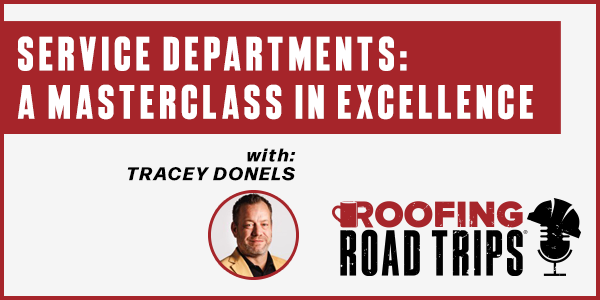Tracey Donels - Service Departments: A Masterclass in Excellence - PODCAST TRANSCRIPT
June 30, 2025 at 12:00 p.m.Editor's note: The following is the transcript of a live interview with Tracey Donels of Service First Solutions. You can read the interview below or listen to the podcast.
Intro: Welcome to Roofing Road Trips, the podcast that takes you on a thrilling journey across the world of roofing. From fascinating interviews with roofing experts to on-the-road adventures, we'll uncover the stories, innovations and challenges that shape the rooftops over our heads. So fasten your seatbelts and join us as we embark on this exciting Roofing Road Trip.
Heidi Ellsworth: Hello and welcome to Roofing Road Trips from Roofer's Coffee Shop. My name is Heidi Ellsworth and as always, we are bringing to you podcasts that help the roofing business. We want to help take your business to the next level. So we have to bring experts in who can really help and talk through everything. And today, it's all about service. And you know who we have if we're talking service, it's Tracey Donels with Service First Solutions. Tracey, hello again.
Tracey Donels: Hello, Heidi. It seems like I've been running into you everywhere lately.
Heidi Ellsworth: We were just at the Western States Board meeting. That was so much fun. And next week we'll be at Florida.
Tracey Donels: Yes we will. All over the place. You're going to get too much from me.
Heidi Ellsworth: Never, ever, ever. Because I love these topics. I love what you're doing for contractors across the industry. Tracey, you're just making such a difference.
Tracey Donels: Well, thank you so much. I really love what I do. It's the reason that I'm not a contractor anymore because I wanted to stay involved in service and I know I knew the easiest way to stay involved in service is help other people grow their service and the repair and maintenance department.
Heidi Ellsworth: And it's making such a difference. So let's start out with, why don't you go ahead For those few who don't know you, do an introduction of yourself, your history in roofing and tell us about your company.
Tracey Donels: Excellent. My name is Tracey Donels. I've been in a commercial roofing now for almost 20 years. I make the joke that I was the guy who started in a roofing service truck and then never left the service department after 20 years. I've done just about every job there is. I can't imagine a service job there has been that I haven't done. Everywhere from a helper in a truck to inspector estimator coordinator, salesperson, manager, executive level, overseeing all kinds of fun stuff.
Heidi Ellsworth: Love it.
Tracey Donels: Grew our department at KPost or helped grow our department at KPost from three trucks when I first started there to almost $9 million before COVID. And we've been doing this now for about five years at Service First Solutions. And we are a training, coaching and consulting company that works specifically with contractors to grow their repair and maintenance departments. And that's where the name comes from, Service First Solutions, because if you start with service, it's amazing what else will come your way.
Heidi Ellsworth: And how much you'll grow.
Tracey Donels: Yes.
Heidi Ellsworth: Yeah.
Tracey Donels: Yes.
Heidi Ellsworth: And Tracey, I have just been so honored this year to be able to listen to you speak a couple of times. At the ServiceCon, I've heard you speak at NRP in the past. Just a number of events. And so I wanted to sneak in and talk about some of the things that you are speaking around to all these contractor groups out there, because it was to me, incredibly inspirational. And so let's start with, I think a lot of people know you have done an amazing job comparing Chick-fil-A to roofing service. Can you share that story and how you have made that comparison?
Tracey Donels: Yes. Well, when I started traveling around and seeing a lot of departments, I had the benefit of working in a company that really believed in service and we invested in service and I had a good team around me. And it takes a good team to provide good quality service and good quality service at a fast speed. And that's what too many of our contractors don't realize today is service is all about speed. Just like we used to tell the salespeople and stuff like that, you can't go out and sell yourself on, you put a better roof on than everybody else. That's what everybody's selling themselves on.
Heidi Ellsworth: Exactly.
Tracey Donels: And you start selling yourself on safety and all the things like that. Well, nowadays, you can't simply go out there and say you're going to do a good repair. No one's going to go and say they do a bad repair. So it's all about providing a good product with good customer service at a high rate of speed. And that's where the Chick-fil-A model comes in. They have a good product. Are they selling filet mignon? No. They're selling quick lunches to satisfy a problem. You're in a rush. You need good quality food and you need it fast. Good customer service would help out as well. So they can do that with Chick-fil-A. And if we can do that with our roofing services ... We're not selling new roofs, we're not selling filet mignon, we're selling roof repairs. And if we can sell roof repairs to solve the emergencies in a fast rate of speed with good customer service, we're not going to care about the price. And look at Chick-fil-A. Chick-fil-A has a good product, great customer service, incredible speed and they're the fastest drive-through around and they're always busy and they close on Sundays and we're okay with it. We're like, "I'll get chicken on Monday. No worries."
Can you imagine if we're a roofing company and somebody called us and say, "Oh, it's Wednesday. We don't work on Wednesday." "Okay. No problem. I'll call you back tomorrow." Couldn't imagine that. But that's where Chick-fil-A is. And we are in the problem-solving business problem. And the more little problems we solve for our customers, the more they're going to come back. And the more they come back, the more problems they have and the bigger problems they have. And if they keep coming back long enough or maybe just enough times, all of a sudden, it's Hey, I need the most expensive thing you have because my roof is in the parking lot or my roof got hailed out. Or You know what? You can't make it last forever. And I trust you implicitly and by chance you also put on new roofs? Oh yes, by chance we do. My last two years when I was at my contracting for more than 50% of our project revenue came directly from service clients. Now, they weren't just all handed to us and stuff like that, but sometimes we got a smarter bid. Sometimes we just know the customer a little bit better. They trust us, we know how to sell. But sometimes it's, Hey, you're my roofer. What do you got? Well, here's a price and transactions closed. And that can really do wonders to a roofing company, not only financially, but just stress wise.
Well now more customers like us, more customers want to do business with us, more customers want to answer an email because we have a relationship. More customers want to be open with us more customers want to give us a second chance. There's a good one. Second chance. The whole reason that we have service departments. So there's so much that the service department can do and so much potential and revenue it can unlock if we just focus on a good product, customer service and speed. Doesn't need to be a perfect repair. It needs to be an adequate repair.
Heidi Ellsworth: I think one of the things too that you really talk about is with Chick-fil-A, they have a process. Every high school kid can come in there and know exactly what they're doing, when they're doing it, where they're doing it, how they're doing it. So you're having that same experience every single time that you drive through that Chick-fil-A. And really, roofing and service is the same thing. The building owners want to know that they can either log in, put in a service request, pick up the phone, whatever, but that they're going to get the same level of service every single time. The same processes. Talk about that.
Tracey Donels: You're exactly correct. They want to know they're going to be taken care of. They want to know that they have a trusted partner that they can communicate with and say, "Hey, I have an issue." And they're going to get to the resolution of that issue ASAP with the team. And then you come back to the Chick-fil-A drive-through. Well, if we're growing, if we're doing a lot, we can't wear multiple hats. The person at Chick-fil-A that who takes your order who's standing outside in the 90 degree heat doesn't then run inside and start making chicken nuggets when you order a number two. That's not how it works. Their job is to sit there and make orders and the next person does their job, next person does their job, next person does their job. And when they're really busy, you know what the manager's doing, the manager's managing. The manager isn't also cooking or running the register or outside taking orders. They're managing. They're helping their team, they're managing their team so you go through the process. And what that also allows is for us to get this done with just normal, good quality people who have been trained.
My joke is always, there's no Colonel Sanders who's working at Chick-fil-A. It's 14 and 85 year olds and they're doing a bang up job because they've been given a role ... Good quality people, they've been given a role, they've been given training and they've been given leadership. Fast food chicken isn't rocket science. And I would say commercial roofing isn't rocket science. Not that it's not difficult, but it can be taught.
Heidi Ellsworth: And obviously when you come to commercial roofing, how important it is that the building owner does have someone they can trust to know that their treasures, their people, their tenants, that everything is being protected down there. And it's interesting, Tracey, because when I first started in this industry a couple of decades ago, it was called negotiated work and that's how people called it. They said, "It's negotiated work. We've negotiated with this building owner. We're going to give him a new roof. We're going to do some maintenance over here and stuff." They didn't even call it service and maintenance until probably what? 10, 15 years ago. And then really people realized, to your point earlier, that this is something that can not only be a great profit center, but it also brings in more work. So how does mindset really come in with the contractors as they're building these internal support systems and building service teams? How should they be thinking Maybe they aren't associating those two things from the past, but really there is a whole mindset for service.
Tracey Donels: It's a totally different mindset. I like to think of it as the golden rule of service. Give your customer the treatment you would expect in return. And that's really what we need to do. And we've all had the experience where we're dealing with a customer service person and we can tell from the behaviors, the voice or the inflection or how they're talking that this person is not interested in helping us. This person is just doing the job. And if we think about what we encounter in the service department of a roofing company, it's everybody's worst day. Nobody ever comes to the service department or calls the service department in a happy mood. They need help and they need help right away. And if you do not want to help them, if you didn't have the right attitude of wanted to help these people, wanting to solve their problems, wanting to take some responsibilities off their plate, wanting. To save them money, whatever it happens to be, it's going to come out in everything you do, every single thing you do. So it is definitely important to have that mindset.
I had a big sign over the door leading out to my service warehouse when I was a contractor and it was both in English and in Spanish and it said, "Treat today's roof as if it was your own." And I told my guys, "If we do that every single day, guess what? I'm going to stand by you but we're still going to screw up every once in a while, but the customer's going to know that we care about them." And this goes to the repeat business, the building of the trust. When we have someone that we trust, that we've been going to for years, we know how they treat us, how they feel about us, that they really care. And we will forgive a mistake because mistakes happen. But if I am the low price provider and this is the first time you've ever met me and I make a mistake, there's a good chance I'm never coming back to your property no matter what I do, I'm painting lawn care, electrical, HVAC or roofing.
Heidi Ellsworth: Yeah.
Tracey Donels: This where I think the service department ... The service department can carry you through a snafu in a project, but I don't care how good you put that roof on, it's not going to sustain a 10-year crappy service relationship.
Heidi Ellsworth: And that relationship I think is what is so critical because to your point, how often do you get a new roof? commercial, maybe 10, 15 years, residential, obviously much longer. And when you're really looking at that, if the contractor isn't keeping that relationship with that building owner year after year, protecting their properties, protecting their assets, then someone else is going to come along. Some other roofing contractor is going to come along. So not only is it about making money every year, obviously that just takes care of itself, but also being in front of it. And most building owners have more than one piece of property. So as you are looking at your overall profit centers, how do you weave service in not only to its own profit center, but also to helping the rest of the business?
Tracey Donels: So usually where we find that with the overturn from service to sales and stuff like that. I hate the term ... And this is where we're get into term like the accounts and stuff like that and things the service runs. I don't like that term. That term makes it sound like, well, they're a house account so we can do less to impress them or to be of good service to them or stuff like that. And to your point, this is all about relationships. We are service providers. Nobody hires a service provider that does bad work. We got that fixed. All the roofers do good work. I've been or done a presentation that says, "Oh yeah, we do bad work." Everybody does good work. Well, also, no one hires a service provider that they don't like. Who's going to invite someone to come back to their property or their house or their multiple properties that they don't like? I don't care how good the work is. And no one begins to like people that you've never met, that you haven't spent time with.
So we think about this idea and then we think about the idea that, okay, every single new customer out there for me already has a roofer. Every single one of them. So now I have to go and tell them why they need to choose my roofing company over somebody else's roofing company. Easiest place to make that distinction is in service because far too many of our contractors in the country still don't prioritize service or focus on service. But even that's going to take repeated visits because I'm just Joe off the street, you just met me and you've been working with your roofer for two years and you're not mad at them right now. It's going to take repeated visits. So you not only remember my name, but then you're willing to talk to me and willing to hear my spiel. And then eventually, guess what? Everybody screws up. Their roofer is going to screw up and they might give me a call or their roofer might go out of business or their roofer might get acquired by somebody. It might be different people working there. Whatever it happens to be. But I can't just call once and then say, "Well, I hope that whenever they have a leak, they'll call me." Never going to happen.
Heidi Ellsworth: Let's talk a little bit about the sales process. And I've been really interested in this because I know with the larger service and maintenance departments, they sometimes have their own sales people which is great. But I think the really successful companies are the ones where preventative maintenance, service and maintenance, all of that, the warranties, everything start with every single salesperson. Every single salesperson, whether they're selling a huge Walmart roof, they're also talking about service during that sale and then it's all part of that initial roofing process. Talk to us about the differences between your more traditional salespeople, including service as they're selling new roofs and then having salespeople who are just working on service side of things.
Tracey Donels: I think if you have someone who is of, let's say, an industry expert who knows roofing and also has the customer's best intentions in heart. What I mean by that is they call up and ask for a re-roof and we go tell them they don't need to re-roof. And that's usually the rub. But if I had things not overselling, provide customers what the solution to the problem they have, not the problem they think they have and I have the capability of selling both re-roofs and repairs, I say, do it. And you have to have a good comp program and all kinds of stuff like that to make sure we're balanced out, all that fun stuff. So I think you can definitely do it. Where I see when they split is usually a lot of times the bigger companies and stuff like that, because we forget that it is personal.
If I have a big account, let's say a big account, multiple millions of square feet, five, six, seven, eight property managers. Couple assistant admin or assistant property managers, probably a couple building engineers in there as well. That could be 13, 14 people that I got to stay in touch with to make sure that this one account is not only happy but growing. The easiest customer to sell is the last customer you've sold. Your biggest customers are going to continue to get bigger. And if I'm not visiting them every so often, I'm not going to know they bought a new portfolio. I'm not going to know they promoted Betty from assistant property manager to property manager now she's got three buildings of her own. I might not know all this stuff if I'm not in front of them. If I'm not in front of them. To your point, someone else is going to be in front of them and say, "Hey, has that Tracey service department screwed up lately yet? Because if he has, I'd be willing to step in right now."
Heidi Ellsworth: Yeah. It's interesting how you say this too because that just totally makes me think. Because if you are a traditional salesperson out there selling re-roofs and you know this property doesn't really have any roofs that are going to be ready for re-roofs yet, you're not going to be spending time with them, you're not going to be focused on them. Whereas if you have a service sales team, they aren't going to care. They're going to be focused on every single building owner and every single customer because service is all the time. Extreme weather, just wear and tear, whatever it may be, people on the roof, new equipment. And so that makes so much sense.
Tracey Donels: We think about the compensation programs we have and the bonus programs we have. I can have the best of intentions to treat my company, teach my customer, but there also might be some times out there where I just need the money and they're on the fence and they need a re-roof or they don't need a re-roof. But I think I could sell more re-roof. And I'll tell you almost the best sales tactic I ever had running my service department was I don't make any money if you buy a re-roof. If you want to buy a $2 million roof, great. That's somebody else. Someone else going to get a bonus and wonderful. If that's what you need, great. But I make the most money if I can keep you from making your biggest expensive purchase for as long as possible.
Heidi Ellsworth: And then be here when you need it.
Tracey Donels: Be here when you need it, when we can't help you anymore and we're probably helping you longer than we've told you. We're probably telling you by now ... Eventually we're going to be like, "Hey, we can't save this roof. We can't save this roof. This roof's done." No, I think you could do it, but eventually ... But if you actually have the customer's, true intentions at heart ... But I used to come in there and, "You don't need a re-roof if you buy one. I ain't going to make a dime. Why don't you buy my $5,000 repair instead of the $180,000 re-roof?"
Heidi Ellsworth: Makes sense. Okay. So what you really focus on and what you are just excelling in the industry with right now is training. So it's training. And I want to talk about that across the board because there's so many areas that need training. From the owner of the company on why service, which obviously has to be a huge training education moment to the more traditional re-roof team, to starting a service department, then working with that service department and then training the crews, the technicians who are going out there. Talk about that process. Of really working with the business and providing training on creating a successful service department from the top all the way to the people who are in the trucks heading towards the roof.
Tracey Donels: I think that's a good point because it does take everyone. It is a culture. Service is a culture. Safety is a culture. You've even been in some companies where sales is a culture. Culture eats strategy for breakfast every day. So it definitely is a culture from the top down. The owner has to know why we have a service department, has to believe in service because if they don't think we should have the customer's best intention or our best instances of heart, there's no way that the people below them are going to.
Heidi Ellsworth: Right. Exactly.
Tracey Donels: So it really has to start from the top on not only why services important, but why speed is important. Speed comes down to capacity. Capacity comes down to people. People come down to pay and the owner controls the payroll a lot of times. So a lot of times it starts with the owner. But everyone below that has to have some kind of foothold in service as well. You talked about salespeople. Knowing when to sell them a re-roof, when to not sell them a re-roof. Know to include that preventive maintenance package into the re-roof. So we keep working with them over and over again and we get to re-roof the building maybe every 20 years. Or I come from Texas, maybe every four years. You never know what happens when you're in a storm area. And how to sell that preventive maintenance and how to have those conversations with new customers or potential new customers who already have a roof or two that they use. And what are the tactics to get past that gatekeeper? What are the questions to ask to start biting off the little problems so we can start building the trust with little problems.
Heidi Ellsworth: Right.
Tracey Donels: To a service manager running a department to a service estimator to not only how to inspect the roof, but the nuts and bolts of roofing, but how to price it out, how to read blueprints and how to bid TI work, all that stuff. How to make your proposal easier to read, easier to buy, easier to understand. All that stuff. How to design and carry out a preventive maintenance program. Preventive maintenance programs I see today are far too complicated. They need to be simple. Simple to carry out, is simple to sell, simple to explain. And if I could explain it easily, I can sell it easily and we can carry it out easily.
Heidi Ellsworth: I love that.
Tracey Donels: And you mentioned the field and that's a lot of the biggest one. I love all my same manufacturing friends, but they want to train you how to lay down millions of square feet of membrane at a time. We're never going to do it as a service. About 10% of our time on the roof is spent repairing and a good 90% is spent either investigating, cleaning up, documenting, communicating, whatever all the other stuff is. So much less of it is actually on the repairs. But that doesn't mean we don't need to be trained on it and we need to be trained on lots of other stuff if I'm a field technician. This is my most important tool if I'm a field technician, it's this phone right here. Because communication is the number one thing we do and we need to go through that training and know how to communicate with a customer, how to document what we did, how to recognize potential recommended actions following a leak repair. All that kind of stuff. There's so many things to learn in service and so very few of them have anything to ...
Heidi Ellsworth: Well, when you think about the technology of service and what's happening with all the technology, the software companies out there, the iPads, the phones that are on the roof and the other thing I think when you're talking technology is you have to also bring in the fact that you're going to be training on building owner expectations, whether they're working through a national network like National Roofing Partners or whether they are just have their own check-in, check-ut apps, their own special software that they have to use. So there's a lot of training for the technicians and for the service department that you just don't have in the rest of the company.
Tracey Donels: Yeah. It's specialized. We have to do it this different way and we may have to do it a different way three times in one day because I go to a JLL building one day and I have to use this app and then I go do work for a third party company the next and I got to do a different app and then I go to, I don't know, the airport to fix a leak and there's a whole different slew of processes. So again, it comes back to so little of the stuff we do in the service department is roofing. So much more of it is communication or documentation or investing.
Heidi Ellsworth: And when you say documentation and speed, which you talked about earlier, that is the other one. Because in service and maintenance, often you're looking at leak control. You're looking at things that are critical right then. And those national accounts, those national softwares, the national building facility managers and stuff, they want their invoices, they want their reports, they want everything that fast. And I don't mean this to make it sound complicated if you're thinking about starting a service department, I'm just saying getting people who know ... It's like why recreate the wheel, I think. Working with someone like Service First Solutions to me, Tracey is really, there's so much out there, but to your point, it's processes, it's not that complicated. But why try to figure it out and recreate the wheel all by yourself?
Tracey Donels: Yes. If my life depended on it and I needed to lose 50 pounds, I wouldn't say, "Well, I'm going to go do some research and figure out how to be a fitness expert." No. I'd go hire a dietician and a personal trainer and we'd get this thing knocked out in a heartbeat. I went to an exercise class today has a coach, tells us what to do. They're an expert. I'm not an expert. So you're right, it's not rocket science. But that doesn't mean we couldn't benefit from a roadmap. And that's-
Heidi Ellsworth: And some of it is a little complicated. It's just how it is.
Tracey Donels: We want to be that roadmap for the service departments. The contractors know where they are, they know where they want to get to. Why not have someone help you avoid some dead ends, show you some shortcuts and if you get stalled out on the side of the road because maybe life happens or business happens or weather happens or whatever happens that goes on, it's something to get us back up on the road and get us jump started and give us a little boost. And that's where that culture and that attitude comes in. If I didn't care about service and I didn't want to help people grow their service department, you'd be able to tell in every action and thing I do, but you can tell by how I get a little jazzed up about this that I love doing this. And I almost like it when people bring me problems more than when they bring me, oh, we have a great scorecard and everything's fantastic and it's balloons and ribbons and we're going to have a parade. It's like aw.
Heidi Ellsworth: Aw, let me help.
Tracey Donels: [inaudible 00:30:32] for us to talk about.
Heidi Ellsworth: Oh my gosh.
Tracey Donels: But luckily, the service department, we're always dealing with other people's problems and we never know what's coming down the pike and it keeps us on our toes.
Heidi Ellsworth: I love it. Tracey, thank you. Thank you for this great conversation. Thank you for everything you do for the industry and how much you're helping the professionalism of the industry overall. And service and maintenance really is key to the increase of professionalism within the roofing industry over the last couple of decades and there's just no question about it. So thank you for everything you do.
Tracey Donels: Thank you so much, Heidi and I look forward to seeing you next week.
Heidi Ellsworth: I know. I can't wait. It's going to be so much fun. We're going to be talking again there. For everybody out there, this is how you get started. This is how you get started with a service program. Or if you have a service program, you're just like, "Man, I want to supercharge it a little bit. I want to take it to the next level.", Tracey and his team are amazing, so please check out their directory on Roofers Coffee Shop and follow them. We have a number of podcasts. We have a number of videos that we've done and this can change your business. So one last time. Thank you, Tracey and I'll see you next week.
Tracey Donels: Thank you so much, Heidi. Take care.
Heidi Ellsworth: Thank you. Please, everybody, like I said, check out the directory, but check out all the podcasts under the RLW navigation. Be sure to subscribe and set those notifications on your favorite podcast channel so you don't miss a single episode. We'll be seeing you next time on Roofing Road Trip.
Outro: If you've enjoyed the ride, don't forget to hit that subscribe button and join us on every roofing adventure. Make sure to visit rooferscoffeeshop.com to learn more. Thanks for tuning in and we'll catch you on the next Roofing Road Trip.





















Comments
Leave a Reply
Have an account? Login to leave a comment!
Sign In